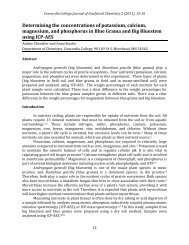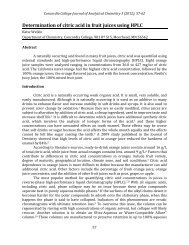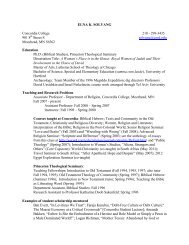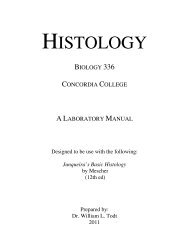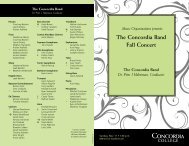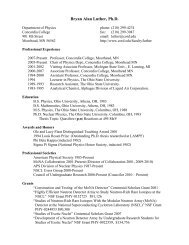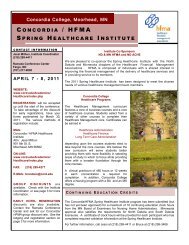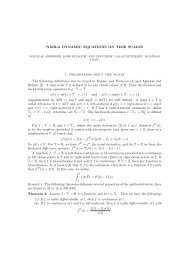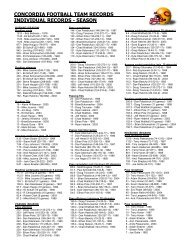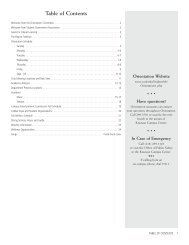Djembe - Concordia College
Djembe - Concordia College
Djembe - Concordia College
Create successful ePaper yourself
Turn your PDF publications into a flip-book with our unique Google optimized e-Paper software.
22<br />
Albert Memmi on his part echoes Fanon and Césaire on how colonization works to depersonalize<br />
the colonized. He calls the stubborn effort to dehumanize the colonized the “mark of the plural”.<br />
He writes: “The colonized is never characterized in an individual manner; he is entitled only to<br />
drown in an anonymous collectivity (“They are this.” “They are all the same.”).” 11<br />
In the long run, and by dint of repetition, the process becomes extraordinarily efficient: the<br />
colonized internalizes many of the labels invented by the colonizer. “Constant repetition carries<br />
conviction.” 12 People’s indolence in postcolonial societies in Africa results partly from decades of<br />
propaganda and disinformation. No wonder leaders and many people, including some intellectuals,<br />
are skeptical about their own ability to stand up for their rights and answers to development<br />
challenges without imitating Western models or getting their approval. An article in South Asian<br />
Voice Review is by far unambiguous about this malaise:<br />
Robbed of any measure of self-confidence, the colonized (and even post-colonial)<br />
intelligentsia looked upon its heritage with skepticism or disdain, or conversely,<br />
sought refuge in fundamentalism, obscurantism, or idealistic myth-making. When<br />
a native tradition had the stamp of approval from a ‘respected’ Western ‘authority’,<br />
it attracted excited and flattering attention. But rarely and only in relatively isolated<br />
cases, was it possible for the colonized cultural intelligentsia to rise above the<br />
cultural stereotypes, and critically explore and examine its cultural legacy for any<br />
intrinsic (or sustainable) merit. 13<br />
Following the analysis above, one may wonder about the fate of freedom and independence<br />
in African postcolonial countries. Freedom many leaders of the liberation movements shed their<br />
blood in seeking becomes meaningless. Obviously, many impediments skillfully set by former<br />
colonial masters and approved by their puppets render independence futile or simply invalidate it.<br />
What shall we then characterize African countries? Are they independent or postcolonial dependent<br />
entities? Anyhow, history of colonization is repeating itself; wrapped up in its humanitarian<br />
garments, neocolonialism is so effective today that one would wonder if colonization ever ended.<br />
What a utopian idea to imagine the advent of a whole new world. Césaire, for instance, was<br />
dreaming at such a world with the overthrow of the old colonialist system. 14 Robin D. G. Kelley<br />
writes: “As the true radicals of postcolonial theory will tell you, we are hardly in a postcolonial<br />
moment. The official apparatus might have been removed, but the political, economic, and cultural<br />
links established by colonial domination still remain with some alterations.” 15 It’s sad to notice<br />
how the aggression of sovereign countries is carried out for fallacious or fabricated reasons with<br />
the help of the United Nations, which is supposed to stand guarantor for justice and equity, freedom<br />
and peace in the world.<br />
The West would like to flatten the world not so as to explain it, like Thomas Friedman<br />
does in his acclaimed book, but to dominate it. 16 And yet, the world is bigger and more diverse than<br />
their interests. Postcolonial citizens are improving their access to knowledge through education<br />
that helps them grow stronger and prepares them for genuine freedom. This reminds me of the<br />
famous poem, I too, Langston Hughes wrote to express his will and readiness for equality, despite<br />
the subjugation of his body in the days of racial segregation in America. The excerpt of the poem<br />
reads:



